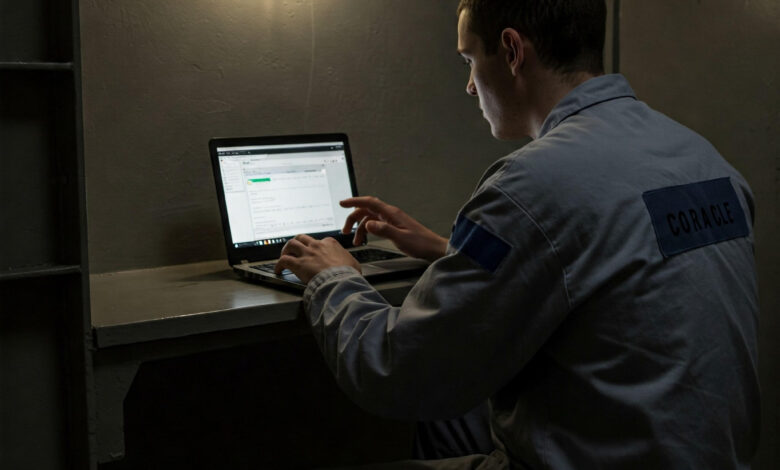
Prisoners could be encouraged to embrace learning and move on from crime thanks to a new AI innovation designed to transform education for inmates.
Education company Coracle has secured backing from Innovate UK to fund a new partnership with the University of Hertfordshire to develop an AI system that will support Coracle’s work in digital access for prison education.
Tailoring prison education in real time
The ‘AI cellmate’ will enhance Coracle’s platform to understand a prisoner’s learning needs, styles and habits and tailor output in real time to guide them on the path to learning.
Coracle, led by James Tweed, already provides prisoners in 93 institutions with access to education via specially designed offline Chromebooks, pre-loaded with courses within a secure learning platform.
Its service helps prisoners access courses from partners including The Open University, Prisoners’ Education Trust, Aim eLearning, Hatch Digital and a range of vocational programmes.
A challenging education background
James Tweed, founder and CEO of Coracle, said prisoners pose significant challenges for educators but also present a unique opportunity to improve education for all.
“Prisoners are one of the most challenging groups when it comes to education. Many had poor experiences at school, and a very high proportion were excluded. There is also a disproportionately high number with dyslexia, ADHD, or some other form of neurodiversity,” said Tweed.
“This AI system will adapt to the individual’s needs and learning style. Even though they are learning offline, the AI will understand how the user wants to learn, recognise their progress and anything they’re struggling with as it occurs, and tailor its approach accordingly.
“It will get to know them as a learner and could indeed be a very helpful cellmate.
“We believe that the impact on their future outcomes could be huge. If we increase engagement in learning with inmates, then we can expect a fall in reoffending.”
Beyond the criminal justice system
The new AI-powered platform will initially be launched in prisons, but Tweed believes its potential extends far beyond the criminal justice system.
“I think it is very possible that in the future, we’ll all be learning from AI-powered systems tailored to our needs and preferences. But if we can make this work in a prison – and I believe we can – then it can work almost anywhere.”
Coracle has entered into a Knowledge Transfer Partnership (KTP) with the University of Hertfordshire, which involves creating an opportunity for a PhD student to develop the programme.
Using AI for good
Tweed emphasised the importance of using AI for positive change, particularly in addressing reoffending rates and improving prisoner rehabilitation.
“I think we all want to see AI used for good. For me, reducing reoffending and combating educational failure is at the top of my list.
“There’s a danger that, while we on the outside are embracing AI and digital technologies, those in prisons will be left so far behind they might never be able to rejoin society.”
An end to digital exclusion
Tweed’s mission is to end digital exclusion. He says that prisoners often re-enter society poorly equipped to deal with our digitised world. “Can you imagine how scary it would be if you’ve been in prison for the past seven or eight years and, when you leave, you’ve never seen contactless payments?” he said.
“In that situation, you’ve never bought a train ticket on an app. The odds are stacked against you from the start and we punish people for not having the skills we have become used to.
“Everyone needs basic digital skills just to get by in the world today. We need to be able to use a computer or touch screen to make appointments, buy things or access services. This wasn’t the case not very long ago, so prisoners emerging into this digital world without these skills may quickly find themselves in problems.”
Providing the skills to reintegrate
Tweed says that, to reduce the risk of reoffending, prisoners need digital skills. Without these, says the entrepreneur, we are wasting the potential of former inmates.
“I think that’s really wasteful,” he says. “There are a lot of people in prison who absolutely would and could be valuable members of society, but we need to help them get there. And that means we need to give them the skills.
“If we want people to reintegrate into society and not reoffend, we need to ensure they have the skills to do so.”
Digital learning can overcome difficulties
In UK prisons, as well as in many institutions worldwide, there is a large amount of neurodiversity and learning difficulties. Illiteracy and innumeracy are commonplace and many people enter the system with few skills.
“The sad truth is many arrive in the prison system with no skills and then leave without them, too,” says Tweed. “This makes reoffending all too likely.
“But digital offers us a way forward as it means learning can take place in the cell and at the pace the learner requires. With AI, we can help make this learning environment even more effective.”





